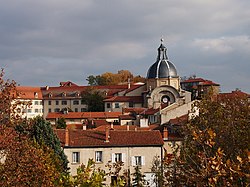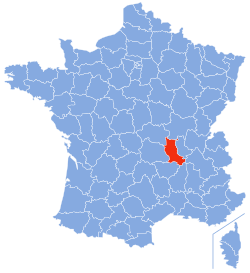Loire (/lwɑːr/; French pronunciation: [lwaʁ]; Arpitan: Lêre; Occitan: Léger or Leir) is a landlocked département in the Auvergne-Rhône-Alpes region of France occupying the river Loire's upper reaches. Its prefecture is Saint-Étienne. It had a population of 765,634 in 2019.[3]
Loire
| |
|---|---|
 Montbrison in 2007 | |
 Location of Loire in France | |
| Coordinates: 45°05′N 04°05′E / 45.083°N 4.083°E | |
| Country | France |
| Region | Auvergne-Rhône-Alpes |
| Prefecture | Saint-Étienne |
| Subprefectures | Montbrison Roanne |
| Government | |
| • President of the Departmental Council | Georges Ziegler[1] (LR) |
| Area | |
• Total | 4,781 km2 (1,846 sq mi) |
| Population (2022)[2] | |
• Total | 772,041 |
| • Rank | 30th |
| • Density | 160/km2 (420/sq mi) |
| Demonym | Ligerian (Ligérien) |
| Time zone | UTC+1 (CET) |
| • Summer (DST) | UTC+2 (CEST) |
| Department number | 42 |
| Arrondissements | 3 |
| Cantons | 21 |
| Communes | 323 |
| ^1 French Land Register data, which exclude estuaries and lakes, ponds and glaciers larger than 1 km2 | |
History
editLoire was created in 1793 when the Rhône-et-Loire département was split into two, about three years after it was created in 1790. This was a response to counter-revolutionary activities in Lyon which, by population, was the country's second largest city. By splitting Rhône-et-Loire the government sought to protect the French Revolution from the potential power and influence of counter revolutionary activity in the Lyon region.
The Loire département roughly corresponds to the former province of Forez.
The departmental capitals (prefectures) throughout its history are as follows:[4]
- Feurs 1793–1795
- Montbrison 1795–1855
- Saint-Étienne since 1855
Geography
editLoire is part of the current administrative region of Auvergne-Rhône-Alpes and is surrounded by the départements of Rhône, Isère, Ardèche, Haute-Loire, Puy-de-Dôme, Allier, and Saône-et-Loire.
The river Loire traverses the department from south to north.
The Loire département is divided into three arrondissements:
Parts of the department belong to Parc naturel régional Livradois-Forez.
Demographics
editThe inhabitants of the département are called Ligériens. The industrial city of Saint-Étienne with its agglomeration contains about half of the inhabitants of the département.[5]
Population development since 1801:
|
| ||||||||||||||||||||||||||||||||||||||||||||||||||||||||||||||||||||||||||||||||||||
| |||||||||||||||||||||||||||||||||||||||||||||||||||||||||||||||||||||||||||||||||||||
| source:[4][6] | |||||||||||||||||||||||||||||||||||||||||||||||||||||||||||||||||||||||||||||||||||||
Principal towns
editThe most populous commune is Saint-Étienne, the prefecture. As of 2019, there are 6 communes with more than 15,000 inhabitants:[3]
| Commune | Population (2019) |
|---|---|
| Saint-Étienne | 173,821 |
| Saint-Chamond | 34,841 |
| Roanne | 33,809 |
| Firminy | 16,901 |
| Montbrison | 15,915 |
| Saint-Just-Saint-Rambert | 15,229 |
Politics
editThe president of the Departmental Council is Georges Ziegler, elected in October 2017.
Current National Assembly Representatives
edit| Constituency | Member[7] | Party | |
|---|---|---|---|
| Loire's 1st constituency | Pierrick Courbon | PS | |
| Loire's 2nd constituency | Andrée Taurinya | LFI | |
| Loire's 3rd constituency | Emmanuel Mandon | MoDem | |
| Loire's 4th constituency | Sylvie Bonnet | LR | |
| Loire's 5th constituency | Antoine Vermorel-Marques | LR | |
| Loire's 6th constituency | Jean-Pierre Taite | LR | |
Tourism
editSee also
editReferences
edit- ^ "Répertoire national des élus: les conseillers départementaux". data.gouv.fr, Plateforme ouverte des données publiques françaises (in French). 4 May 2022.
- ^ "Populations de référence 2022" (in French). The National Institute of Statistics and Economic Studies. 19 December 2024.
- ^ a b Populations légales 2019: 42 Loire, INSEE
- ^ a b "Historique de la Loire". Le SPLAF.
- ^ Comparateur de territoires, Unité urbaine 2020 de Saint-Étienne (00753), Département de la Loire (42), INSEE
- ^ "Évolution et structure de la population en 2016". INSEE.
- ^ Nationale, Assemblée. "Assemblée nationale ~ Les députés, le vote de la loi, le Parlement français". Assemblée nationale.
External links
edit- (in French) Prefecture website
- (in French) Loire Departmental Council website

